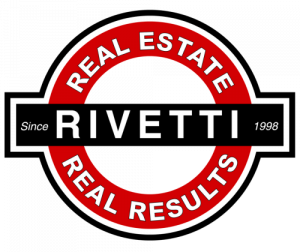Petaluma
1264 Mountain View Ave.
2 Bedrooms | 1 Baths | + Office/Studio | 1,200 sq. ft.
Offered for $1,075,000
FOR SALE
→1264 Mountain View Ave.
2 Bedrooms, 1 Baths, + Ofc/Studio, 1,200 sq. ft.
$1,075,000
- MLS: Off-Market
- 2 Bedrooms
- 1 Baths
- 1,200 sq. ft.
- Bonus Garage Conversion
- Year Built: 1955
- HOA: No
- Garage: Converted
- School: Grant District
- Central Heat/Cooling
- Levels: Single Story
- Lot: 6,098 sq. ft.
- New Kitchen Remodel
- New Bathroom Remodel
- Updated Appliances
- LifeProof™ Flooring
- Sun Run Solar
- Battery Storage
- Backyard Primed For Entertaining
- Fresh Paint and New Fence
WHO YOU WORK WITH MATTERS
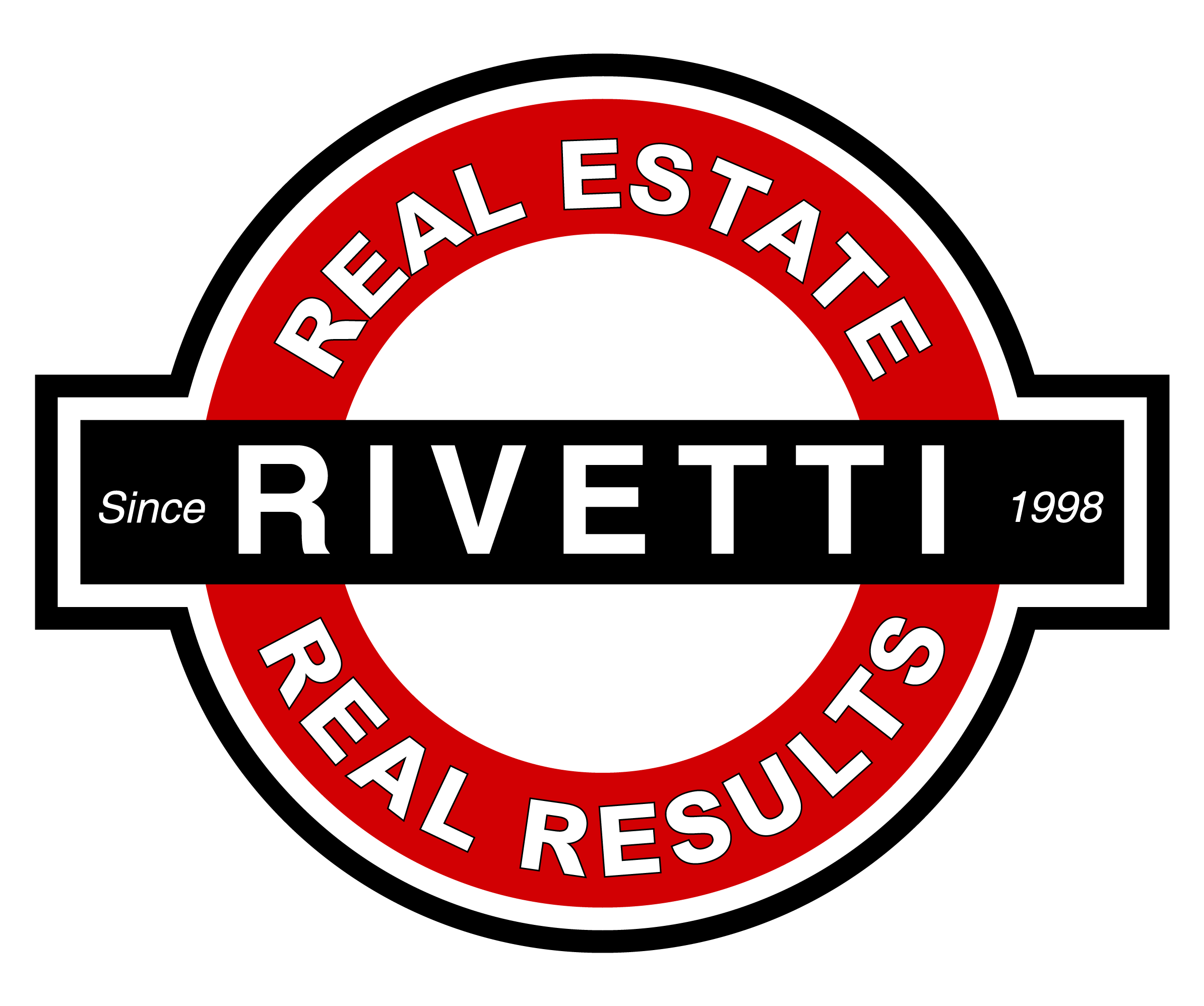
Timo Rivetti has been serving his clients with a highly individualized service tailored to specific needs and requirements since 1998. Unparalleled knowledge and expertise in the region is invaluable when it comes to buying and selling real estate. Hiring an agent who knows the area inside out makes all the difference in a competitive market. Timo and his team of experienced professionals work with each and every client to find and secure the perfect property at the best price, with all of the required amenities in the right neighborhood. When it’s time to make a move, call Timo.

I value 1:1 relationships and have the utmost respect for the work we do together. I love working collaboratively with you to achieve your goals. I am committed to transparency and integrity. Using my professional experience and motivated enthusiasm, I will work step-by-step with you to achieve the outcome you're seeking by developing a tailored marketing plan, briefly outlined below.
What My Clients Have To Say
Rohnert Park
6462 Meadow Pines Ave
2 Bedrooms | 1.5 Baths | 1,069 sq. ft.
Offered for $399,900
SOLD
→6462 Meadow Pines Ave
2 Bedrooms | 1.5 Baths | 1,069 sq. ft.
$399,900
RESULTS MATTER! See below for this home's story↴
With Timo Rivetti, & the Rivetti Real Estate Team, Broker Associate, REALTOR® with Navigate Real Estate, selling homes and land is more than a transaction - it's a curated process of strategy, storytelling, and innovative marketing. Every property is thoughtfully evaluated, and a tailored plan is designed to highlight its most unique features while ensuring maximum exposure to the right buyers.
This Property is a shining example. It showcases how our proven approach - from strategic positioning to compelling presentation - consistently delivers results that exceed expectations.
HOW WE DID IT
- MLS: 325016728
- 2 Bedrooms
- 1.5 Baths
- 1,069 sq. ft.
- End Unit
- Year Built: 1978
- HOA: Yes - $740/Monthly
- Garage: 2 Car
- Subdivision: Meadow Pines
- Wood Burning Fireplace
- Levels: Two Story
- Updated Kitchen
- Newer Windows
- Private Patio
- Community Amenities
- Wood Floors
- Lots of Light
- Vaulted Ceilings
- Move In Ready
- Affordable
WHO YOU WORK WITH MATTERS

Timo Rivetti has been serving his clients with a highly individualized service tailored to specific needs and requirements since 1998. Unparalleled knowledge and expertise in the region is invaluable when it comes to buying and selling real estate. Hiring an agent who knows the area inside out makes all the difference in a competitive market. Timo and his team of experienced professionals work with each and every client to find and secure the perfect property at the best price, with all of the required amenities in the right neighborhood. When it’s time to make a move, call Timo.

What My Clients Have To Say
Many people are hoping mortgage rates will come down before they buy a home. But will that actually happen? According to the latest forecasts, experts say rates will decline, but not by as much as a lot of people want.
The good news? Even if they don’t drop substantially, there are still ways to make buying a home more affordable.
How Much Will Rates Drop?
A few months ago, experts were forecasting mortgage rates could dip below 6% by the end of the year. But recent projections suggest that may not happen after all.
While mortgage rates are still expected to decline some later this year, projections from Fannie Mae, the Mortgage Bankers Association (MBA), and Wells Fargo now show them stabilizing closer to the 6.5% to 7% range (see below):
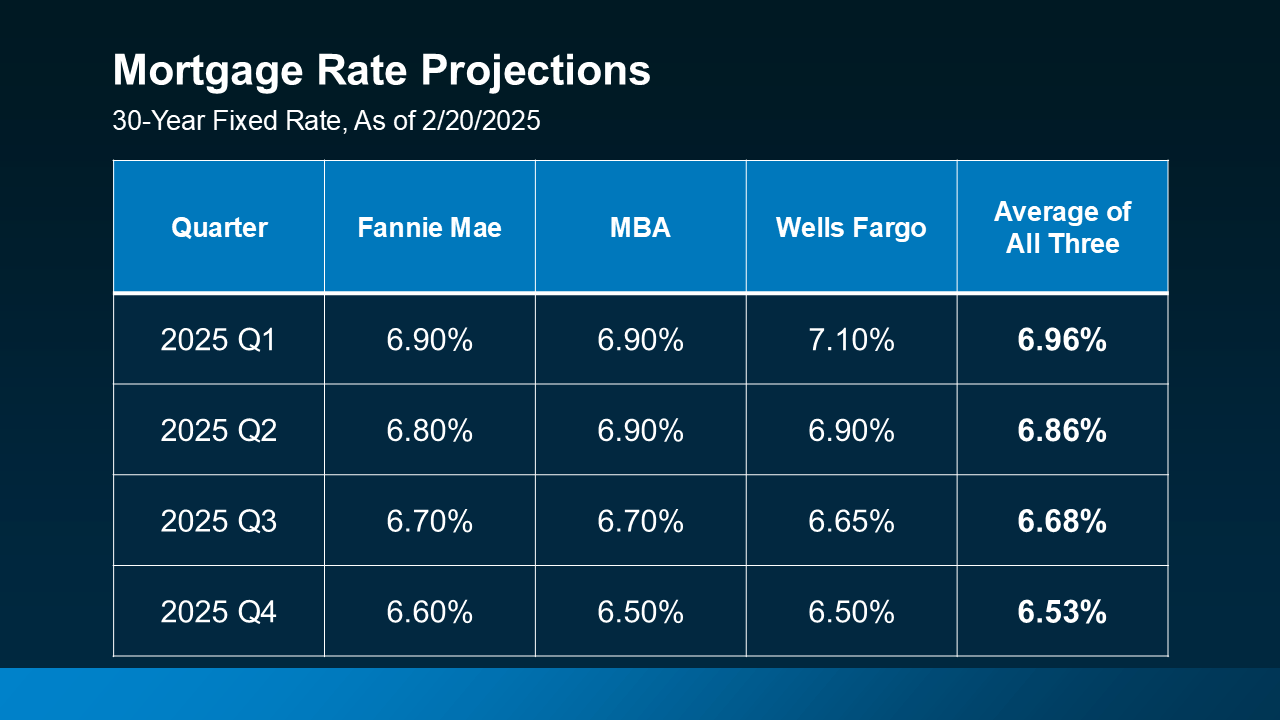 That means if you’re holding off on buying a home in hopes of much lower mortgage rates, you may be waiting a while. And if you need to move because something in your life has changed, like a new job, a new baby, or a marriage – waiting that long may not be an option.
That means if you’re holding off on buying a home in hopes of much lower mortgage rates, you may be waiting a while. And if you need to move because something in your life has changed, like a new job, a new baby, or a marriage – waiting that long may not be an option.
Creative Financing Options in Today’s Market
Since rates aren’t expected to decline as much as originally expected, it may be worth considering alternative financing options that could help you get into a home sooner rather than later. Here are three strategies to discuss with your lender to see if any of these make sense for you:
1. Mortgage Buydowns
A mortgage buydown allows you to pay an upfront fee to lower your mortgage rate for a set period of time. This can be especially helpful if you want or need a lower monthly payment early on. In fact, 27% of agents say first-time homebuyers are increasingly requesting buydowns from sellers in order to buy a home right now.
2. Adjustable-Rate Mortgages
Adjustable-rate mortgages (ARMs) typically start with a lower mortgage rate than a traditional 30-year fixed mortgage. This makes them an attractive option, especially if you expect rates to drop in the coming years or plan to refinance later.
And if you remember the housing crash, know that today’s ARMs aren’t like the risky ones back then. Lance Lambert, Co-Founder of ResiClub, helps drive this point home by saying:
“. . . ARM products today are different from many of the products issued in the mid-2000s. Before 2008, lenders often approved ARMs based on borrowers ability to pay the initial lower interest rates. And sometimes they didn’t even check that (remember Ninja loans). Today, adjustable-rate borrowers qualify based on their ability to cover a higher monthly payment, not just the initial lower payment.”
In simple terms, banks used to give loans without checking to see if buyers could afford them. Now, lenders verify income, assets, and jobs, reducing the risks associated with ARMs compared to the past.
3. Assumable Mortgages
An assumable mortgage allows you to take over the seller’s existing loan — including its lower mortgage rate. And with more than 11 million homes qualifying for this option according to U.S. News, it’s worth exploring if you want or need a better rate.
Bottom Line
Waiting for a big decline in mortgage rates may not be the best strategy. Instead, options like buydowns, ARMs, or assumable mortgages could make homeownership more affordable right now. Connect with a local lender to explore what works for you.
How does this impact your homebuying plans this year?
Some homeowners hesitate to sell because they’ve got unanswered questions that hold them back. But a lot of times their concerns are based on misconceptions, not facts. And if they’d just talk to an agent about it, they’d see these doubts aren’t necessarily a hurdle at all.
If uncertainty is keeping you from making a move, it’s time to get the real answers. The ones you deserve. And to take the pressure off, you don’t have to ask the questions, because here’s the data that answers them.
1. Is It Even a Good Idea To Move Right Now?
If you own a home already, you may be tempted to wait because you don’t want to sell and take on a higher mortgage rate on your next house. But your move may be a lot more feasible than you think, and that’s because of how much your house has likely grown in value.
Think about it. Do you know anyone in your neighborhood who’s sold their house recently? If so, did you hear what it sold for? With how much home values have gone up in recent years, the number may surprise you. According to Lawrence Yun, Chief Economist at the National Association of Realtors (NAR), the typical homeowner has gained $147,000 in housing wealth in the last five years alone.
That’s significant – and when you sell, that can give you what you need to fund your next move.
2. Will I Be Able To Find a Home I Like?
If this is on your mind, it’s probably because you remember just how hard it was to find a home over the past few years. But in today’s market, it isn’t as challenging.
Data from Realtor.com shows how much inventory has increased – it’s up nearly 25% compared to this time last year (see graph below):
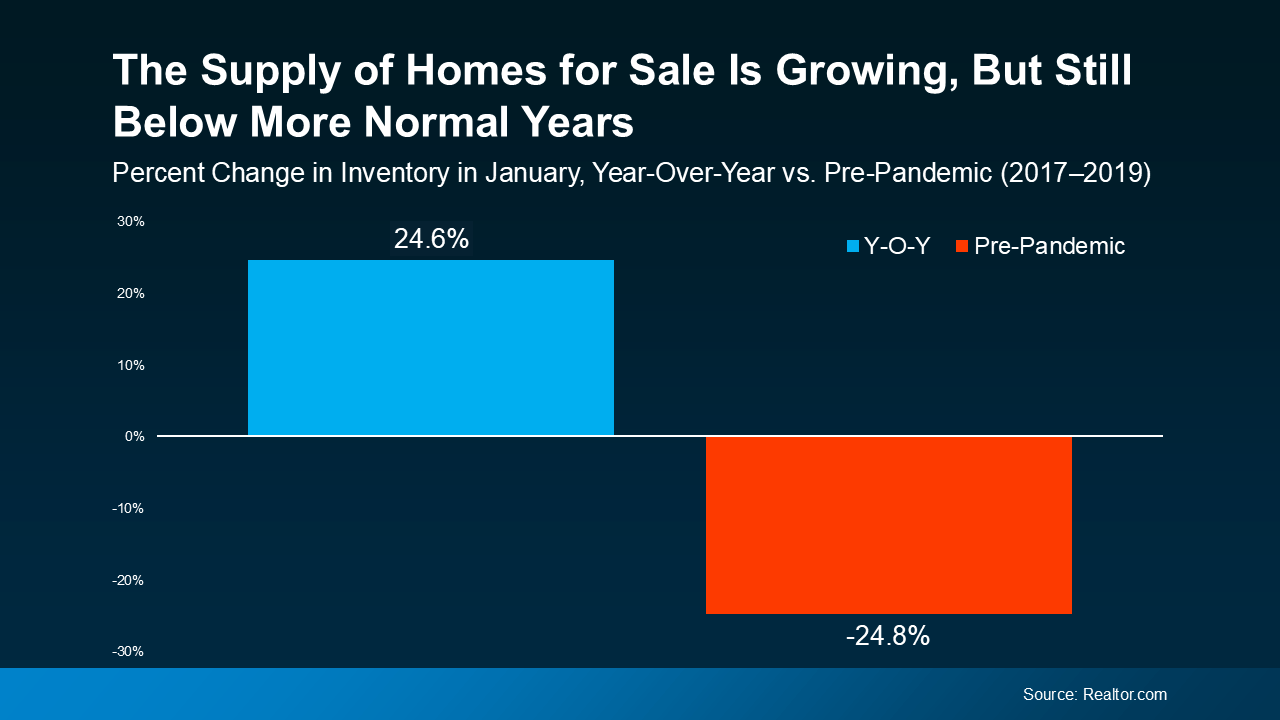 Even though inventory is still below more normal pre-pandemic levels, it’s improved a lot in the past year. And the best part is, experts say it’ll grow another 10 to 15% this year. That means you have more options for your move – and the best chance in years to find a home you love.
Even though inventory is still below more normal pre-pandemic levels, it’s improved a lot in the past year. And the best part is, experts say it’ll grow another 10 to 15% this year. That means you have more options for your move – and the best chance in years to find a home you love.
3. Are Buyers Still Buying?
And last, if you’re worried no one’s buying with rates and prices where they are right now, here’s some perspective that can help. While there weren’t as many home sales last year as there’d be in a normal market, roughly 4.24 million homes still sold (not including new construction), according to the National Association of Realtors (NAR). And the expectation is that number will rise in 2025. But even if we only match how many homes sold last year, here’s what that looks like.
- 4.24 million homes ÷ 365 days in a year = 11,616 homes sell each day
- 11,616 homes ÷ 24 hours in a day = 484 homes sell per hour
- 484 homes ÷ 60 minutes = 8 homes sell every minute
Think about that. Just in the time it took you to read this, 8 homes sold. Let this reassure you – the market isn’t at a standstill. Every day, thousands of people buy, and they’re looking for homes like yours.
Bottom Line
When you’re ready to walk through what’s on your mind, I have the answers you need. And in the meantime, tell me: what’s holding you back from making your move?
It’s no secret that affordability is tough with where mortgage rates and home prices are right now. And that may have you worried about how you’ll be able to buy a home. But, if you don’t need a ton of space, you may find you have more cost-effective options in an unexpected place: new home communities.
Builders Are Building Smaller Homes
Since smaller homes typically come with smaller price tags, buyers have turned their attention to homes with less square footage — and builders have shifted their focus to capitalize on that demand. As U.S. News notes:
“The combination of higher home prices and mortgage rates has strained a lot of people’s budgets. And that’s something builders recognize. To this end, they may be leaning toward smaller spaces . . .That, in turn, can lead to savings for buyers.”
Data from the Census shows the overall builder trend toward smaller, single-family homes has been over the last couple of years (see graph below):
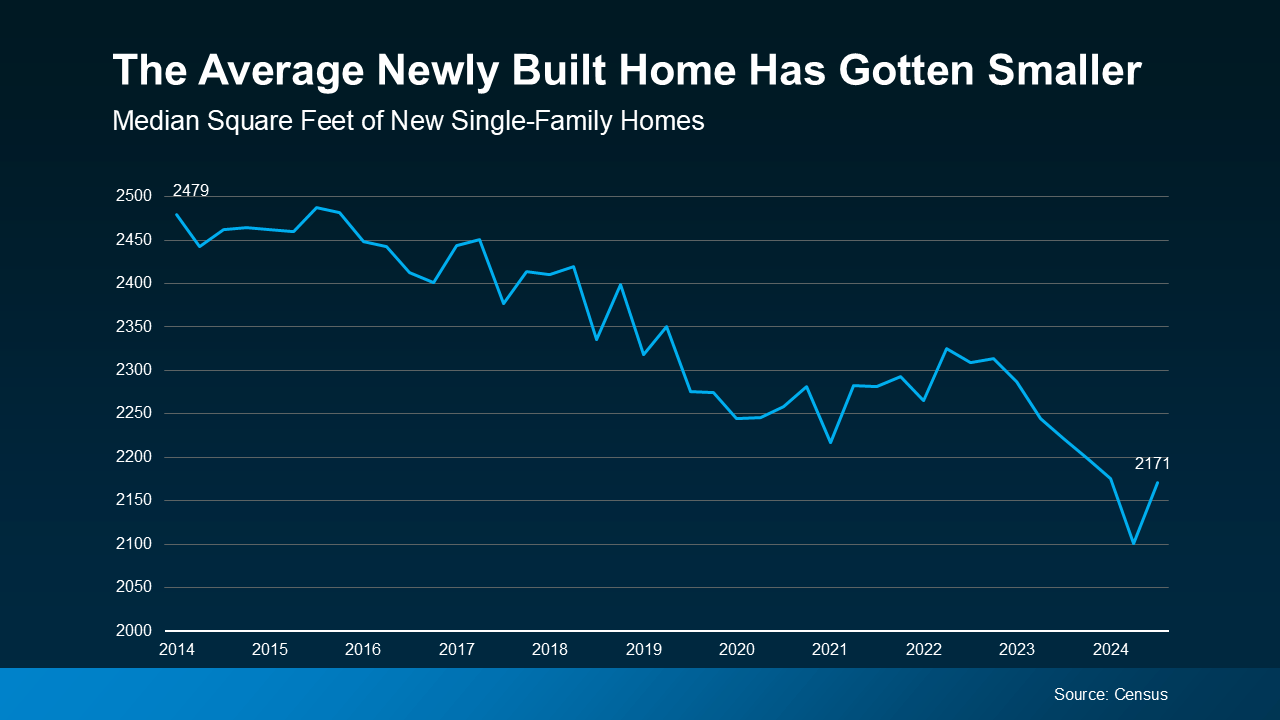 As the graph shows, the average size of a brand-new home has dropped from 2,309 square feet in Q3 2022 to 2,171 square feet in Q3 2024. That’s a difference of 138 square feet.
As the graph shows, the average size of a brand-new home has dropped from 2,309 square feet in Q3 2022 to 2,171 square feet in Q3 2024. That’s a difference of 138 square feet.
At the end of the day, builders want to build what they know will sell. And the number one thing homebuyers are looking for right now is less expensive options to help offset today’s affordability challenges. As Multi-Housing News notes:
“The growing trend toward smaller homes is evident. These homes are less expensive to build and more attainable for many middle-income families, meeting both housing needs and modern lifestyle preferences.”
The Benefits of These Brand-New Homes
So, if you’re having trouble finding a home in your budget, it might be worth exploring newly built homes with a smaller footprint.
Not to mention, since newly built homes come with brand new everything, they have fewer maintenance needs and some of the latest features available, like energy-efficient appliances and HVAC. That’ll help you save on repair costs and your monthly utility bills. Sounds like an all-around win.
Bottom Line
Today’s builders are focusing their efforts on smaller homes at lower price points. That could give you more opportunity to find something that fits your budget. If you’re planning to buy soon, let’s connect to explore what’s on the market in your area and get your homeownership goals over the finish line.
Petaluma
478 1st Street
3 Bedrooms | 3.5 Baths | 1,759 sq. ft.
Offered for $895,000
FOR SALE
→478 1st Street
3 Bedrooms, 2.5 Baths, 1,759
$895,000
- MLS: Off-Market
- 3 Bedrooms
- 3.5 Baths
- 1,759 sq. ft.
- Year Built: 2013
- YHOA: Yes
- Garage: 1 Car
- Subdivision: Celsius 44
- Riverfront Community
- New Kitchen
- New Primary Bath
- Remodeled Baths
- EV Charger Ready
- Loft Space
- Updated Fireplace Mantel
- Open Concept
Welcome to 478 1st St. Located in the coveted Celsius 44 at Foundry Wharf Riverfront area, this rare two-story townhouse offers modern luxury & just a short walk from vibrant downtown Petaluma, this remodeled gem is perfect for those seeking style, convenience, and comfort. The home spans 1,759 sq ft across two stories, with the kitchen and living area thoughtfully placed on the ground floor, allowing for easy access and flow. The layout includes 3 bedrooms and 3.5 bathrooms.
Recent upgrades include a brand-new kitchen with top-of-the-line KitchenAid appliances, including a refrigerator, dishwasher, oven/microwave, and wine fridge. The primary bathroom has been completely renovated with new cabinets, countertops, sinks, faucets, lighting, mirror, medicine cabinets, and a glass shower door. Additional bathrooms have new vanities, sinks, faucets, toilets, and lighting.
The interior features new doors, updated lighting fixtures, fresh paint, and new flooring throughout, with carpeting on the stairs. The living area includes an updated fireplace mantle.
The garage is EV charger-ready with a dedicated plug. Situated near downtown Petaluma’s shopping, dining, and entertainment, with scenic views and outdoor activities at the riverfront, 478 1st Street seamlessly blends sophisticated design with modern comforts.
Living in Petaluma offers an exceptional lifestyle, blending small-town charm with modern conveniences. The historic downtown area is known for its vibrant atmosphere, where you’ll find boutique shopping, artisan eateries, and the picturesque riverfront, perfect for scenic strolls. Petaluma’s prime location allows easy access to all that Sonoma County has to offer, from world-class wineries to beautiful beaches and endless hiking opportunities. Just a short drive from Marin and San Francisco, Petaluma provides a perfect balance of rural tranquility and urban accessibility, making it an ideal place to call home.
WHO YOU WORK WITH MATTERS

Timo Rivetti has been serving his clients with a highly individualized service tailored to specific needs and requirements since 1998. Unparalleled knowledge and expertise in the region is invaluable when it comes to buying and selling real estate. Hiring an agent who knows the area inside out makes all the difference in a competitive market. Timo and his team of experienced professionals work with each and every client to find and secure the perfect property at the best price, with all of the required amenities in the right neighborhood. When it’s time to make a move, call Timo.

I value 1:1 relationships and have the utmost respect for the work we do together. I love working collaboratively with you to achieve your goals. I am committed to transparency and integrity. Using my professional experience and motivated enthusiasm, I will work step-by-step with you to achieve the outcome you're seeking by developing a tailored marketing plan, briefly outlined below.
What My Clients Have To Say
It’s easy to get caught up in the idea of waiting for the perfect moment to make your move – especially in today’s market. Maybe you’re holding out and hoping mortgage rates will drop, or that home prices will fall. But here’s what you need to realize: trying to time the market rarely works. And here’s why.
There is no perfect market.
No matter when you buy, there’s always some benefit and some sort of trade-off – and that’s not a bad thing. That’s just the reality of it. If you’re not sure you buy into that, think back to the last 5 years in housing.
Just a few years ago, mortgage rates hit a historic low. To take advantage of that, a ton of buyers rushed to buy a home and lock in those lower rates. The side effect? With such a big increase in how many buyers were purchasing, the homes on the market were snapped up fast. And since that resulted in so few homes left for sale, bidding wars became the norm and home prices went through the roof. Those buyers got a great rate, but they had other things to contend with.
Now, with higher rates and higher prices, it’s more expensive to buy. You can’t argue that. But at the same time, the number of homes for sale is at the highest point in several years. That means you have more options to choose from and you’ll be less likely to find yourself in a pull-out-all-the-stops bidding war. Again, there are benefits and trade-offs in any market.
So, if you have a reason to move and can afford to do so, you’ve got to take advantage of the trends that work in your favor and lean on a pro to help you navigate the rest. As Bankrate says:
“The complexities of the current conditions mean that, now more than ever, it’s smart to lean on the guidance of an experienced local real estate agent. If you want to enter the housing market in 2025, whether as a buyer or a seller, let a pro lead the way for you.”
While achieving your goals may feel like an uphill battle in today’s complex market, it is doable. But you’ll need the help of a trusted real estate agent and a lender.
Your agent will help you explore creative solutions – like looking into different housing types (like smaller condos), considering homes that need a little elbow grease, or casting a wider net for your search area. And your lender will walk you through different loan options and down payment assistance programs, so you know what you need to do to make the numbers work for you. As Yahoo Finance says:
“Buying a house at a time when both mortgage rates and home prices are favorable is a challenge. You probably shouldn’t try to time the housing market . . . Buy when it makes sense for you personally.”
Bottom Line
There’s no perfect time to move – every market has its pros and cons. The key is knowing how to make the most of the factors working in your favor. If you need to move and can afford to do it, let’s connect so you’ll have the guidance and tools to make it possible.
Knowing what to budget for when buying a home may feel intimidating — but it doesn’t have to be. By understanding the costs you may encounter upfront, you can take control of the process.
Here are just a few things experts say you should be thinking about as you plan ahead.
1. Down Payment
Saving for your down payment is likely top of mind. But how much do you really need? A common misconception is that you have to put down 20% of the purchase price. But that’s not necessarily the case. Unless it’s specified by your loan type or lender, you don’t have to. There are some home loan options that require as little as 3.5% or even 0% down. An article from The Mortgage Reports explains:
“The amount you need to put down will depend on a variety of factors, including the loan type and your financial goals. If you don’t have a large down payment saved up, don’t worry—there are plenty of options available . . .”
A trusted lender will go over the various loan types with you, any down payment requirements on those, and down payment assistance programs you may qualify for. The more you know ahead of time, the easier the process will be. And the key to getting the information you need is working with a pro to see what’ll work best for your situation.
2. Closing Costs
Make sure you also budget for closing costs, which are a collection of fees and payments made to the various parties involved in your transaction. Bankrate explains:
“Mortgage closing costs are the fees associated with buying a home that you must pay on closing day. Closing costs typically range from 2 to 5 percent of the total loan amount, and they include fees for the appraisal, title insurance and origination and underwriting of the loan.”
When it comes to closing costs, a trusted lender can guide you through specifics and answer any questions you may have. They can also give you a better idea of how much you should be prepared to pay so you can cruise through your closing with confidence.
And as you plan ahead for closing day, be sure to budget for your real estate agent’s professional service fee too, in case the seller doesn’t cover it. But don’t worry, you’ll work with your agent ahead of time to agree on what this is, so you won’t be surprised at the finish line.
3. Earnest Money Deposit
And if you want to cover all your bases, you can also consider saving for an earnest money deposit (EMD). According to Realtor.com, an EMD is typically between 1% and 2% of the total home price and is money you pay as a show of good faith when you make an offer on a house.
But, it’s not an added expense. Instead, it works like a credit and goes toward some of your upfront costs. You’re simply using some of the money you’ve already saved for your purchase to show the seller you’re committed and serious about buying their house. Realtor.com describes how it works as part of your sale:
“It tells the real estate seller you’re in earnest as a buyer . . . Assuming that all goes well and the buyer’s good-faith offer is accepted by the seller, the earnest money funds go toward the down payment and closing costs. In effect, earnest money is just paying more of the down payment and closing costs upfront.”
Keep in mind, this isn’t required, and it doesn’t guarantee your offer will be accepted. It’s important to work with a real estate advisor to understand what’s best for your situation and any specific requirements in your local area. They’ll advise you on what moves you should make so you can make the best possible decisions throughout the buying process.
Bottom Line
The key to a successful homebuying savings strategy? Being informed about what you need to save for. Because, when you understand what to expect, you can plan ahead. With an expert agent and a trusted lender, you’ll have the information you need to move forward with confidence.
You may have heard that staging your home properly can make a big difference when you sell your house, but what exactly is home staging, and is it really worth your time and effort?
Here are a few quick FAQs that can help you decide how much you should prioritize staging as you prep for your move.
What Is Home Staging?
Staging is the process of arranging and decorating your house to highlight its best features and make it as appealing as possible to potential buyers. It can range from simple touch-ups to more extensive setups, depending on your needs and budget.
How Does It Help Me Sell My House?
Studies show good staging does have an impact on your sale. Staging your house well can help you attract more attention from buyers, which ultimately helps it sell faster and maybe for a higher price than an unstaged home (see visual):
 What Are My Staging Options?
What Are My Staging Options?
Now that you see the value, let’s think through your options. The most common is leaning on your agent for their expert advice. They know what buyers like because they’re in showings all the time and hear that feedback first-hand. That expertise is crucial to getting your house market-ready. Basic staging with an agent usually means they give you insight into how you should:
- Declutter and depersonalize by removing photos and personal items
- Arrange your furniture to improve the room’s flow and make it feel bigger
- Add plants, move art, or re-arrange other accessories
Full-service staging is another option if your house needs more hands-on attention. This is when you hire a staging professional or staging company to come in, make recommendations, and do the work for you. Going this route is more involved and that makes it more costly too. That’s because it can include renting furniture and decor to more fully transform a space.
How Do I Know Which One To Pick?
Not sure which one you need? You don’t have to figure that out on your own. Your real estate agent will help determine what level of staging will make the most impact on your house and market.
They can help you decide if professional staging is worth the investment, or if you can knock it out with their advice alone. And just so you know, here are some of the factors an agent will look at to figure that out:
- Market Conditions: If the market is slower, going all in on staging can make your home look move-in ready and attractive to buyers who may otherwise be hesitant. If your local market is very active and homes are selling fast, you may be able to get by with doing less.
- Your Home’s Condition: If your home is vacant or has a unique layout, using a professional stager who can bring in the right furniture and accessories may help buyers truly visualize its full potential.
- Your Budget: Talk to your agent to get an idea of staging costs in your area, as it can be the difference between your house selling and sitting. But if your budget is tight or your home only needs minor updates, your real estate agent can help you think outside of the box by suggesting simple DIY staging tips to help your home look its best.
Bottom Line
Staging your house properly can make it much more attractive to buyers, but it’s not a one-size-fits-all solution, and every home shines differently. Let’s connect to talk through what your home really needs to stand out and sell for top dollar.
When planning a move, a newly built home might not be the first thing that comes to mind. But with more brand-new homes on the market and builders focusing on smaller, more affordable options, this type of home may just be the key to crossing the homebuying finish line.
Here’s why a new build is worth considering – and how an agent can help you find one that meets your needs and your budget.
1. More Newly Built Homes Are Available Right Now
First, let’s break down the types of homes on the market. A newly built home is a house that was just built or is under construction. On the other hand, an existing home is one a homeowner has already lived in.
Right now, the number of existing homes for sale is still low. And, if you’re struggling to find something you like because there aren’t that many existing homes for sale, opening up your search to include brand-new homes could really expand your options. That’s because there are more newly built homes available right now than in a typical year (see graph below):
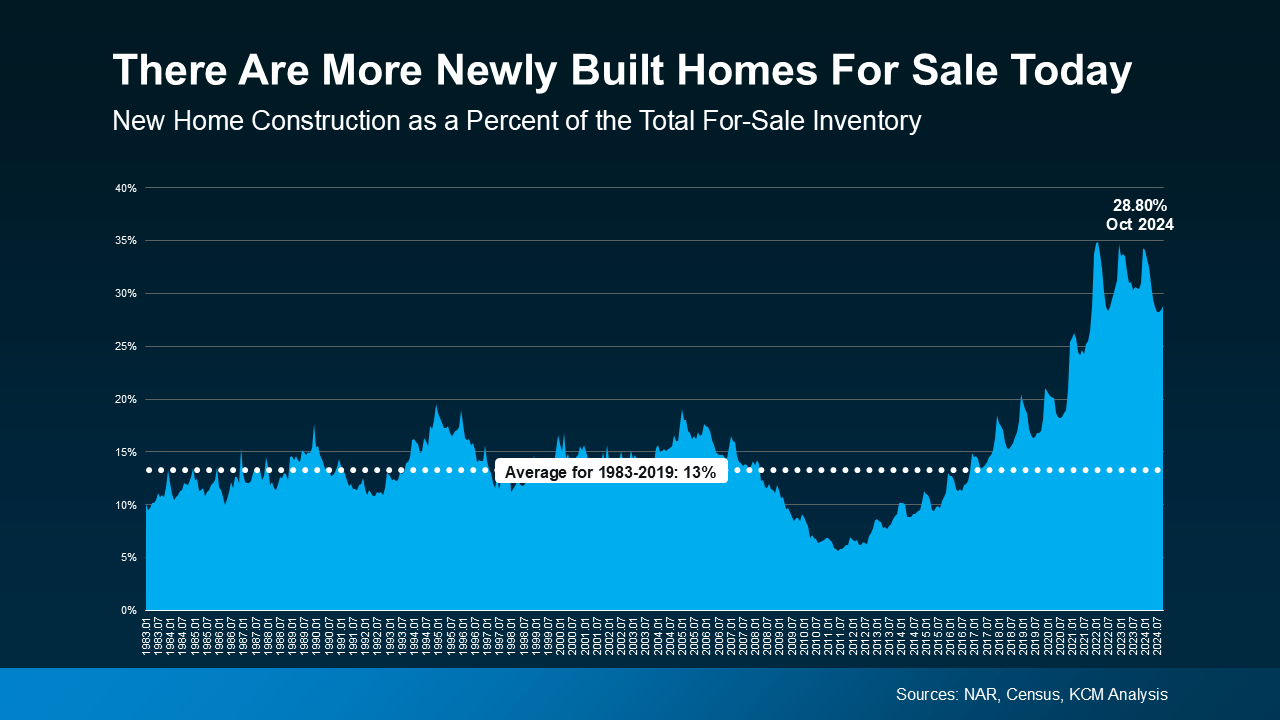 From 1983 to 2019, newly built homes made up only 13% of the total inventory of homes for sale. Today, that number has climbed to 28.8%, according to the most recent data.
From 1983 to 2019, newly built homes made up only 13% of the total inventory of homes for sale. Today, that number has climbed to 28.8%, according to the most recent data.
And as Lawrence Yun, Chief Economist at the National Association of Realtors (NAR), notes:
“Even though existing home sales have been stuck at low levels, newly constructed home sales look to mark one of its best annual performance in 15 years . . . The new home inventory has been consistently rising with homebuilders getting active and making up around 1/3 of total inventory.”
While the uptick in new home construction is encouraging, rest assured that builders aren’t overdoing it, they’re just making up for over a decade of underbuilding. There are still way more buyers than there are homes on the market. But the good news for you is this increase in newly built homes means more options for your search.
2. Newly Built Homes Are Becoming Less Expensive
Still skeptical if a new build is right for you or if they’re even in your budget? The average cost of newly built homes has actually come down from a year ago.
Why is that? Builders know affordability is top of mind for homebuyers right now. So they’re focusing their efforts on building smaller homes they can offer at lower price points and are more likely to sell. As Realtor.com says:
“Builders are increasingly bringing smaller, more affordable homes to the market, so buyers may find more newly-built homes that fit their budget.”
Something to keep in mind: buying a newly built home isn’t the same as buying an existing one. Builder contracts have different fine print. So be sure to partner with a local agent who knows the market, builder reputations, and what to look for in those contracts.
Bottom Line
Depending on your needs and budget, a new build might be the opportunity you’ve been waiting for to bring your homebuying vision to life. If you’re interested in a brand-new home, let’s connect so you can check out what builders in your area are up to.








































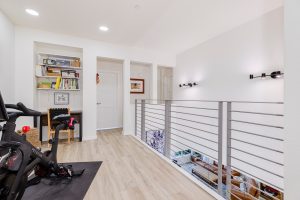


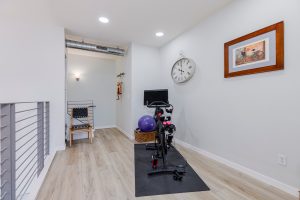






























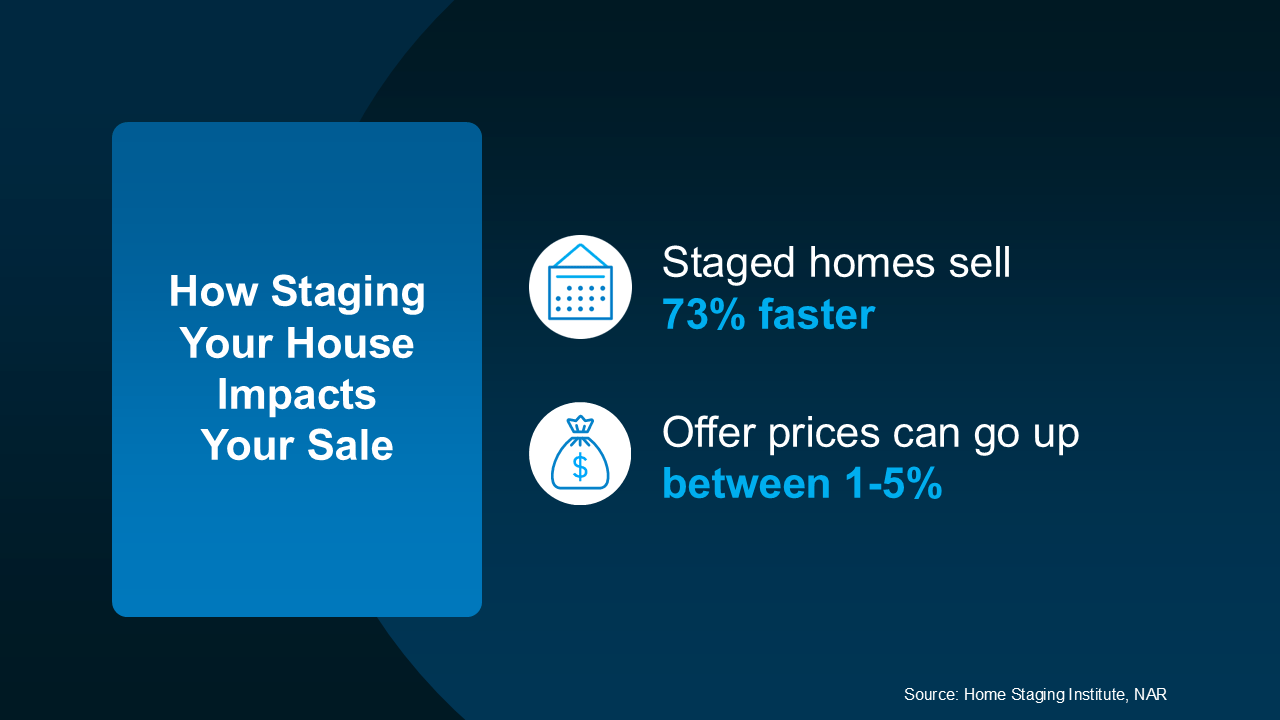 What Are My Staging Options?
What Are My Staging Options?